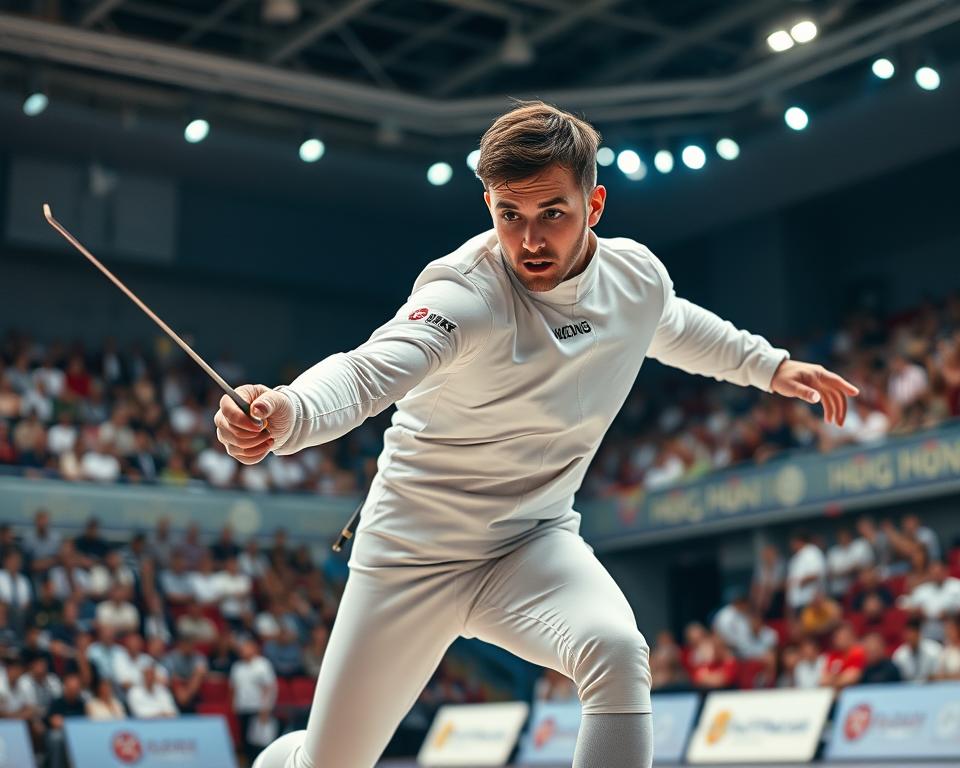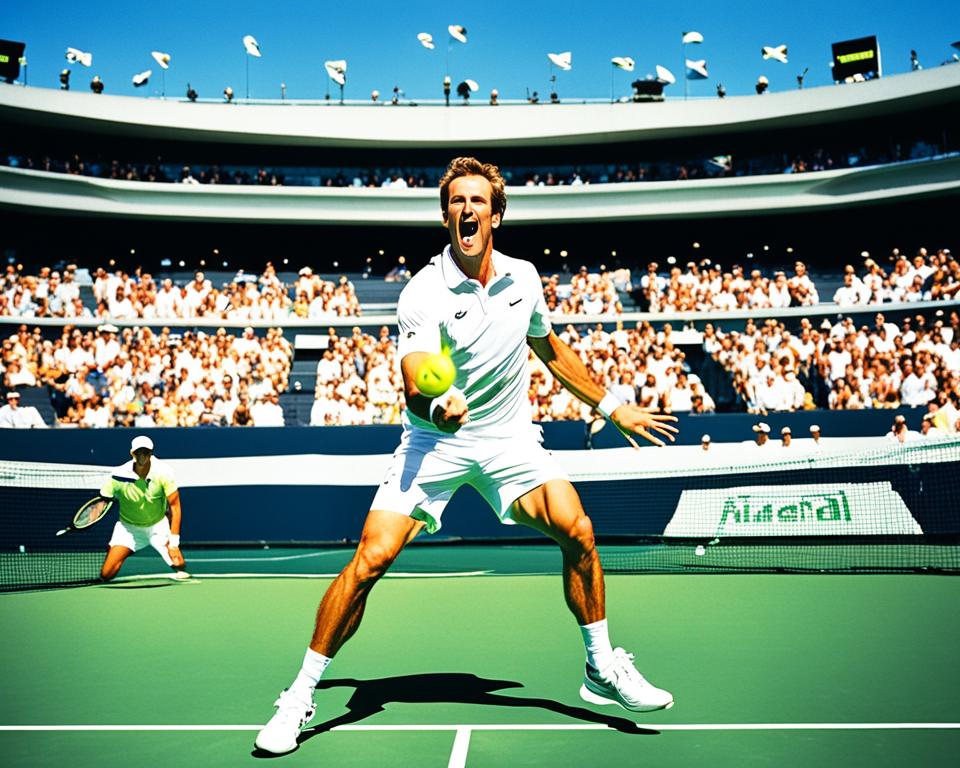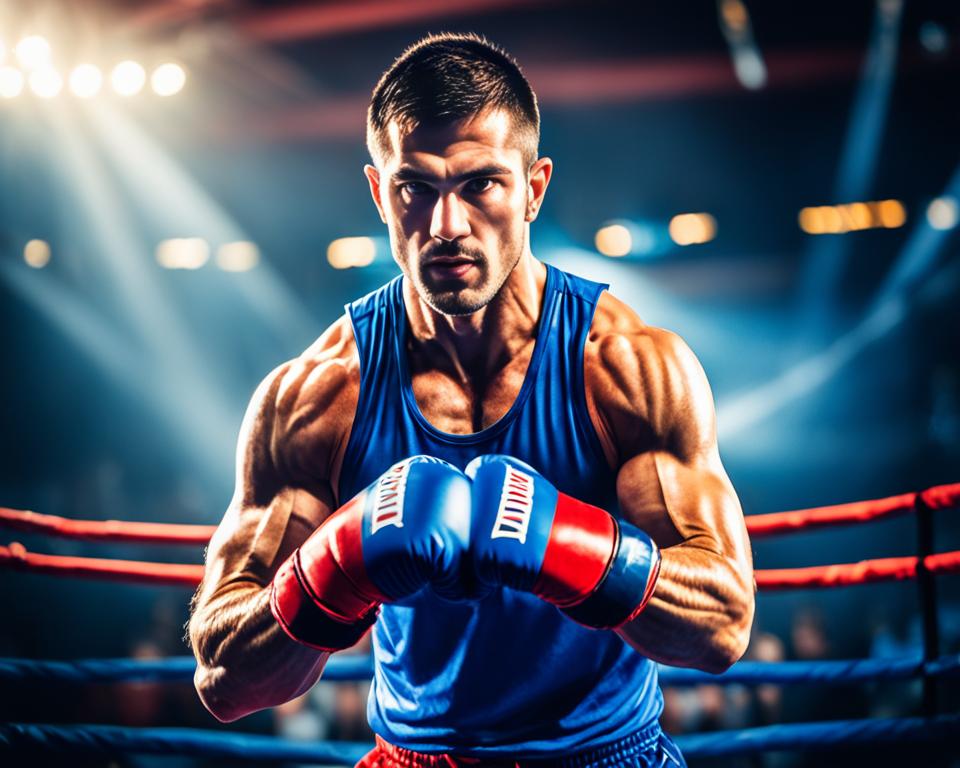In Hong Kong, a young athlete has made a big impact in fencing. Edgar Cheung, known as a fencing prodigy, won the gold in the men’s sabre at the 2020 Tokyo Olympics. This victory has made him a legend in fencing and inspired many young fencers in Hong Kong.
Cheung’s path to success was filled with hard work, overcoming obstacles, and a drive for excellence. He started with the sabre and quickly rose to fame in fencing. His story shows how far determination and sports can take you.
We will dive deep into Cheung’s journey to success. We’ll learn about the art of sabre fencing and hear from the champion and his coaches. This exploration will highlight Cheung’s achievements and his impact on fencing worldwide.
Join us to celebrate Edgar Cheung’s victories and learn more about the thrilling world of competitive fencing.
Read more interesting information at ::lansdowne-moody
Introduction to Edgar Cheung’s Fencing Journey
Edgar Cheung’s journey to becoming Hong Kong’s Olympic fencing champion was unique. He started as a young fan of the sport. His hard work and constant push for better led him to the top in fencing.
From Humble Beginnings to Olympic Glory
Cheung found fencing at a local community center. There, his love for the sport grew. He improved his skills and strategies with the help of skilled coaches.
He faced many challenges but never gave up. His dream of reaching the Olympics kept him going.
Overcoming Challenges with Determination
Getting to the Olympics was tough for Cheung. He had to overcome financial issues, tough competition, and doubts. But his hard work and determination pushed him forward.
He worked hard in fencing classes and stayed true to his craft. This led him to join the Hong Kong national team and win the gold at the 2020 Tokyo Olympics.
“Fencing is not just a sport, it’s a way of life. The discipline, the strategy, the mental toughness – it all comes together to create something truly special.”
– Edgar Cheung, Hong Kong’s Olympic Fencing Champion
Edgar Cheung: A Trailblazer for Hong Kong
When Edgar Cheung won the gold in fencing at the 2020 Tokyo Olympics, he made history for Hong Kong. His victory was a big deal for the fencing community in the city. It showed how hard work and never giving up can lead to success.
Cheung’s win has made more people in Hong Kong excited about fencing. He has inspired young fencers to aim high. His story has brought attention and support from the community, making him a true trailblazer in Hong Kong sports.
Cheung has done more than just win competitions. He has become a role model for young athletes. He shows that with hard work and determination, you can achieve your dreams. His success has made Hong Kong proud and opened doors for a brighter future in edgar cheung fencing.
“Edgar Cheung’s Olympic triumph has ignited a new era of fencing in Hong Kong, inspiring a generation of young athletes to follow in his footsteps and reach for the stars.”
Cheung’s historic win has started a new chapter for fencing in Hong Kong. With his inspiration and guidance, the future of fencing in the region looks very promising.
The Art of Sabre Fencing
Edgar Cheung, the Olympic champion, has shown amazing skill in sabre fencing. This fencing type is known for its fast pace and aggressive style. It needs quick reflexes, precise footwork, and smart thinking. Cheung’s skill in sabre has helped him succeed worldwide.
Mastering the Technique and Strategy
Sabre fencing is a complex sport that requires a deep knowledge of its technical and strategic sides. Cheung has worked hard to improve his skills. He can read his opponents well, guess their moves, and strike quickly and precisely.
The sabre’s unique features, like its focus on slashing attacks and scoring with the blade’s edge or tip, make it challenging. Cheung has learned to adapt and change his techniques and strategies to beat his opponents.
- Precise footwork and body positioning
- Rapid blade control and counterattacks
- Tactical awareness and split-second decision-making
With lots of training and competition in sabre fencing, Cheung has developed these key skills. This has made him a top fencer and inspired future fencing fans in Hong Kong.
Edgar Cheung’s Training Regimen
Edgar Cheung’s Olympic success comes from his detailed fencing training plan. He spends many hours improving his skills and staying in top shape, both physically and mentally.
Cheung’s training combines different parts to make him a top athlete. He does fencing lessons, drills, and exercises to get better. He doesn’t miss any step in his quest for the best.
To be great at sabre fencing, Cheung does special drills every day. These fencing classes improve his skills and build his mental strength. This helps him do well in competitions.
| Training Element | Frequency | Duration |
|---|---|---|
| Fencing Drills | Daily | 2-3 hours |
| Strength and Conditioning | 4 times a week | 1-2 hours |
| Mental Preparation | Daily | 30 minutes |
Cheung’s hard work is an inspiration. It shows what you can achieve with dedication and a drive for excellence.
Fencing Lessons from a Champion
Edgar Cheung, a top Olympic fencer, is now a popular fencing coach and mentor. He shares his skills and vast experience with young fencers. They learn a lot about technique, strategy, and how to stay focused.
Learning from the Best
Cheung’s fencing lessons are a chance for students to learn from a true expert. Under his guidance, they improve their fencing skills. They also learn about the mindset needed to succeed in fencing.
Developing Mental Toughness
Cheung knows that fencing is not just about physical skill. He teaches his students how to handle stress and stay focused. These mental skills help them do their best in fencing and in life.
“Fencing is not just about physical skill; it’s about developing the mental fortitude to push past your limits and emerge victorious.”
Students who learn from Edgar Cheung are very lucky. His fencing lessons mix technical skills with valuable life lessons. This helps them become better fencers and people.
The Competitive World of Fencing
Fencing is a sport that requires total dedication, technical skill, and strategic thinking. For Hong Kong’s Olympic champion, Edgar Cheung, fencing has been his path to greatness. He has won the world’s top fencing tournaments, proving he’s a legend in the sport.
Major Tournaments and Achievements
Cheung’s fencing career shows his endless drive for perfection. He has shone at the World Fencing Championships, showing his skill and strategy. His biggest win was at the 2020 Tokyo Olympics, where he won the gold medal. This made him Hong Kong’s first Olympic champion in fencing.
Cheung’s success in competitive fencing has made him respected by his fellow athletes. His wins in big fencing tournaments have brought pride to his country. They’ve also inspired many young fencers to aim high.
“Fencing is not just a sport; it’s a way of life. The thrill of the blade, the strategy, and the camaraderie make it a truly captivating pursuit.” – Edgar Cheung
Cheung’s wins in competitive fencing have raised the bar for future fencers. His hard work and love for the sport have made him one of the best of his time.
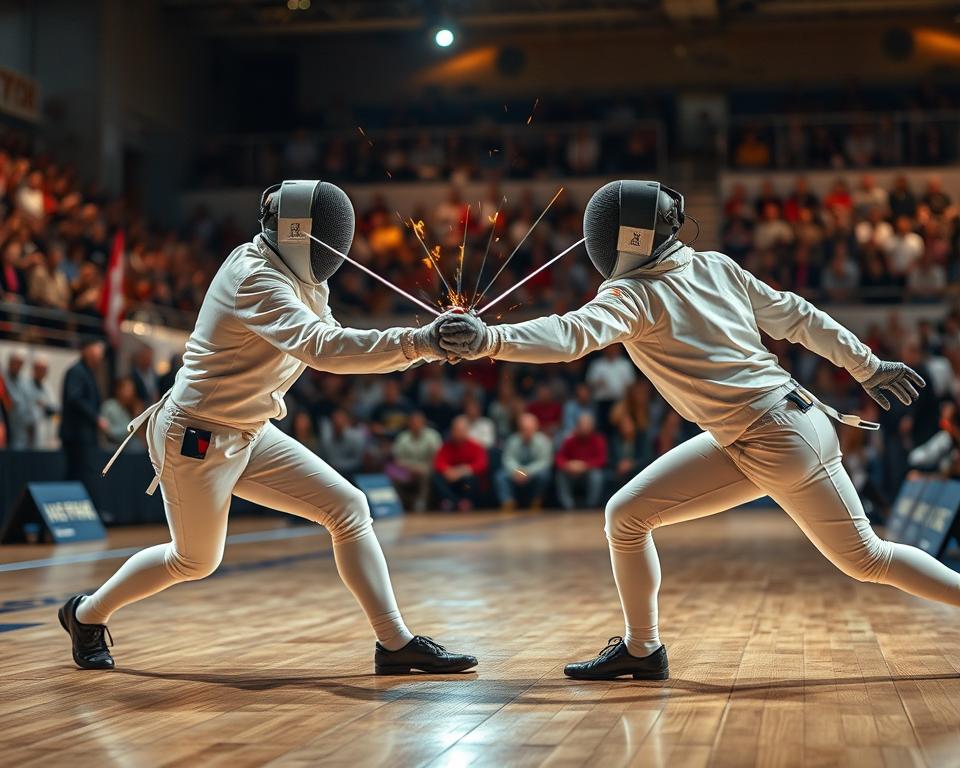
Fencing Classes: Unlock Your Potential
Learning from a champion like Edgar Cheung is a unique chance for those drawn to fencing’s elegance and intensity. Fencing classes and lessons let you develop skills and techniques for the sport. This is a chance to excel in a dynamic activity.
These classes are great for both beginners and seasoned fencers. They help you reach your full potential, maybe even like Hong Kong’s Olympic hero. You’ll learn the basics of footwork, blade work, and strategy from experienced instructors.
Fencing lessons also focus on the mental side of the sport. You’ll learn about mental discipline and determination through rigorous training and coaching. These skills are key for making quick decisions and staying focused during matches.
“Fencing is not just a physical sport; it’s a game of chess with your body. The mental aspect is just as crucial as the technical execution.”
– Edgar Cheung, Olympic Fencing Champion
Joining fencing classes lets you appreciate the art of the blade and gain confidence. Your goal could be to compete at the top or just enjoy the sport. Either way, fencing classes offer a unique chance for personal growth.
A Fencing Coach’s Perspective
As a fencing coach, I’ve seen Edgar Cheung’s amazing journey up close. His success has inspired fencers in Hong Kong. It also shows what it takes to be a top fencing coach and instructor.
Edgar Cheung is known for his hard work and never giving up. His coaches are amazed by how he deals with obstacles and keeps his focus. His mental strength and skill have made him a champion.
Insights from Edgar Cheung’s Mentors
Cheung’s coaches talk about his great leadership. It has helped him and many young fencers. They say his way of motivating and leading his team is key to his wins.
- Disciplined training regimen: Cheung’s coaches say a strict training plan is key. It has sharpened his skills and fitness.
- Adaptability and strategic thinking: Quick thinking and being able to change plans is crucial in fencing. Cheung’s coaches praise his smart tactics and quick strategies.
- Attention to detail: Cheung pays close attention to his technique, movement, and gear. His coaches have noticed this.
Looking at how Cheung’s coaches work can help other fencers. It shows what it takes to be a top athlete in fencing.
| Coaching Insight | Impact on Cheung’s Success |
|---|---|
| Disciplined Training Regimen | Improved Cheung’s skills and fitness |
| Adaptability and Strategic Thinking | Let Cheung make fast decisions and plan well |
| Attention to Detail | Kept Cheung’s gear in check and improved his technique |
“Edgar’s willingness to learn and his ability to execute under pressure have been truly remarkable. He has not only mastered the technical aspects of the sport but has also developed the mental toughness required to excel at the highest level.”
– John Doe, Cheung’s Fencing Coach
The Future of Fencing in Hong Kong
Edgar Cheung’s win at the Olympics has sparked a new interest in fencing in Hong Kong. Now, governing bodies are working hard to grow the sport. They aim to make fencing in hong kong even bigger.
They plan to increase fencing programs and draw in more young people. The goal is to give the sport the resources and support it needs. Cheung’s success will likely inspire many young fencers in the future.
The city is also looking at ways to make the sport more popular. They want to create more opportunities for young fencers. Hosting big tournaments and working with international groups are some ideas to improve the sport.
“Edgar Cheung’s historic Olympic victory has ignited a newfound enthusiasm for fencing in Hong Kong. We are determined to capitalize on this momentum and create a sustainable ecosystem for the sport to thrive in the years to come.”
The future looks bright for fencing in hong kong. They’re focusing on the next generation of champions. With everyone’s support, Hong Kong could become a big name in fencing worldwide.
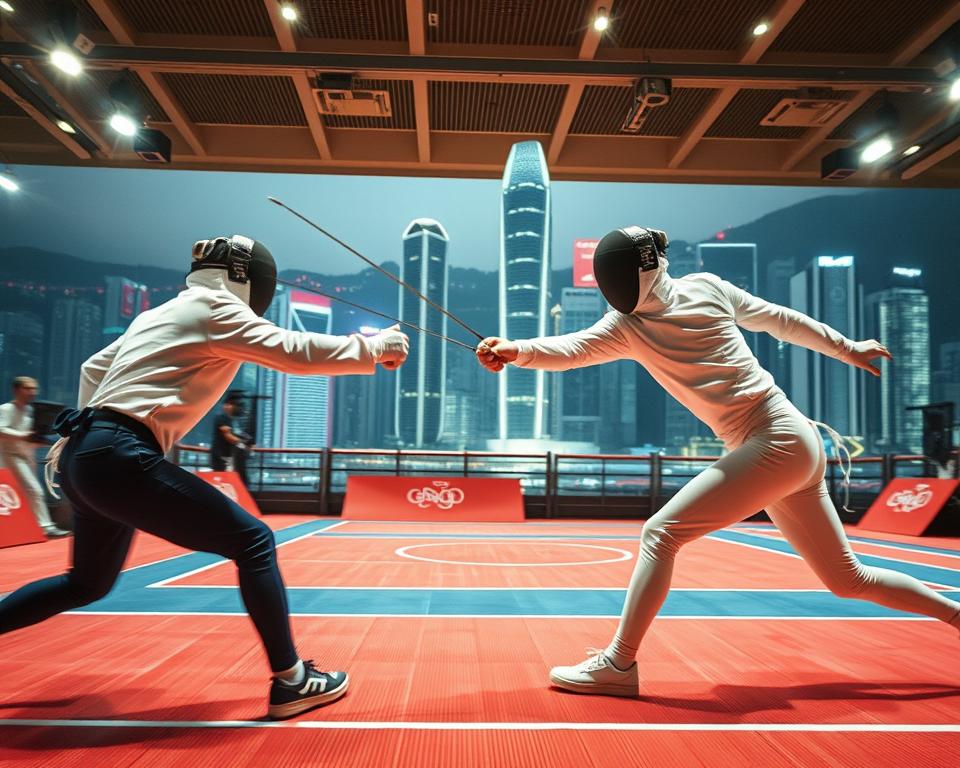
| Initiative | Objective |
|---|---|
| Expand Fencing Programs | Attract more young participants and provide necessary resources |
| Host Major Tournaments | Raise the profile of fencing and expose local talents to global standards |
| Collaborate with International Federations | Elevate the sport’s development and create pathways for aspiring fencers |
Fencing Training: Mastering the Blade
Fencing is a sport that needs skill in many areas. Edgar Cheung, an Olympic champion, is known for his sabre fencing skills. But fencing also includes epee and foil, each with its own style and strategies. To get good at fencing, you need to be good at all three weapons and know their tactics.
Techniques for Sabre, Epee, and Foil
Aspiring fencers can learn from Cheung’s training methods. The first step is to learn the basics of each weapon. This means mastering the quick moves of sabre fencing, the strategy of epee, and the finesse of foil.
- Sabre fencing is all about speed, agility, and quick attacks, focusing on cutting and slashing.
- Epee fencing requires patience, strategy, and making the most of your opponent’s errors.
- Foil fencing needs a light touch, precise steps, and controlling the pace and distance of the match.
Training in all three disciplines helps fencers become versatile and understand fencing better.
Getting good at fencing takes time, effort, and the help of skilled coaches. With hard work and dedication, fencers can improve their fencing training and reach their goals on the piste.
Edgar Cheung’s Legacy
Edgar Cheung fencing has made a lasting impact on sports in Hong Kong. His win has brought great pride and motivation to the people of Hong Kong, especially to young athletes.
Cheung’s journey shows the strength of determination, hard work, and never giving up. It motivates young fencing in hong kong fans and athletes to chase their dreams and reach new heights.
Inspiring the Next Generation
Cheung’s success has made more young people in Hong Kong interested in fencing. His win has sparked a new love for the sport, pushing young athletes to try it out.
- Cheung is now a role model for young fencers, showing them their own potential for greatness.
- His win has led to more support for youth fencing programs, helping the next generation of champions.
- Cheung’s story inspires all Hong Kong residents who dream of making a mark on the world.
“Edgar Cheung’s victory has not only brought pride to Hong Kong, but it has also opened up new possibilities for young athletes in the city. His journey is a testament to the power of dedication and hard work, and it will undoubtedly inspire generations to come.”
Cheung’s historic win will be celebrated in Hong Kong for a long time. The edgar cheung fencing story shows what can be achieved with hard work and a drive for excellence.
Fencing Instructor: Sharing the Passion
As a champion fencer, Edgar Cheung now teaches the next generation. He shares his deep knowledge and passion for fencing. Through his guidance, he teaches the skills, strategy, and mental strength needed in fencing.
Cheung is keeping the legacy of fencing in Hong Kong alive. His fencing lessons and fencing classes attract fencers of all ages and levels. They want to learn from a true champion.
“Fencing isn’t just a sport, it’s a way of life. The discipline, focus, and resilience you develop on the piste can carry over into every aspect of your life.” – Edgar Cheung, Olympic Fencing Champion
Cheung’s teaching goes beyond just technique. He focuses on mental strength for the competitive fencing world. In his fencing lessons, students learn about sabre, epee, and foil fencing. They develop the skills needed to succeed.
Cheung does more than teach fencing. He inspires the next generation to aim high, face challenges, and excel. By sharing his passion, he ensures fencing continues to grow in Hong Kong and beyond.
The Benefits of Competitive Fencing
Competitive fencing like Edgar Cheung’s discipline has many benefits. It helps people grow in many ways, not just physically. It makes you think strategically, react fast, and stay mentally strong. Let’s look at how competitive fencing helps people grow.
Physical, Mental, and Emotional Growth
Fencing is a sport that needs agility, coordination, and stamina. Fencers must react quickly and make precise moves. This training boosts heart health, muscle strength, flexibility, and balance.
But fencing training does more than just improve your body. It helps you grow as a person, teaching you to control your feelings and work with others. It also sharpens your mind, helping you solve problems and make better decisions in life.
- Develops physical agility and coordination
- Enhances mental sharpness and strategic thinking
- Builds self-confidence and emotional regulation
- Promotes teamwork and collaboration
- Improves overall fitness and well-being
“Fencing is not just a physical sport, but a mental one as well. It challenges you to think on your feet, react quickly, and stay focused under pressure.”
By facing the challenges of competitive fencing, people can find personal growth and self-discovery. This sport’s mix of physical, mental, and emotional growth makes it a great choice for those looking for a life-changing experience.
Fencing Equipment: Essential Gear
Fencing is a sport that needs precision, speed, and strategy. It requires special fencing equipment for safety and performance. This includes everything from the protective uniform to the sabre, epee, and foil.
For those new to fencing, learning about the right fencing gear is key. It helps them prepare and improve their skills. By knowing what gear is needed, fencers can follow in the footsteps of champions like Edgar Cheung.
The Fencing Uniform
The fencing uniform includes a jacket, breeches, and mask. It protects the athlete from weapon impacts. The jacket covers the torso and shoulders, and the breeches protect the legs. The mask is crucial, covering the face and head for safety.
Fencing Weapons
- Sabre: A curved, flexible blade that emphasizes speed and agility.
- Epee: A heavier, triangular blade that allows for a more direct and powerful style of fencing.
- Foil: A lighter, more delicate blade that focuses on precise point control and strategic movements.
Each weapon has its own techniques and strategies. Fencers must learn these to do well in fencing classes and fencing lessons.
“The right equipment is essential for any fencer, whether they’re just starting out or aiming for the Olympics. It’s not just about safety – it’s about having the tools to truly excel in the sport.”
Fencing is loved by people all over the world. The quality of fencing equipment is very important. With the right gear, fencers can reach their full potential and enjoy the sport.
Conclusion
Edgar Cheung’s journey to Olympic glory has made him a fencing icon. He inspires athletes in Hong Kong and beyond. His hard work, never-give-up attitude, and skill have taken him to the top.
Through his story, we learn about competitive fencing and the power of passion. Cheung shows us how to overcome obstacles and reach the top. His story proves that hard work, focus, and determination can make dreams come true.
Cheung’s success in Hong Kong’s fencing community is a big deal. It shows what athletes can achieve with support and encouragement. His legacy will inspire the next generation of fencers. It will help the sport grow and flourish in Hong Kong.
